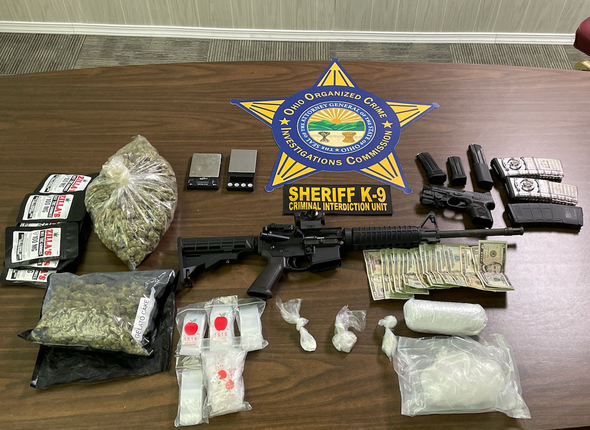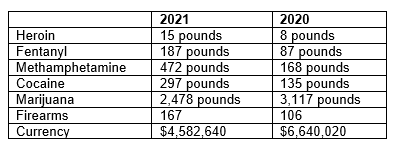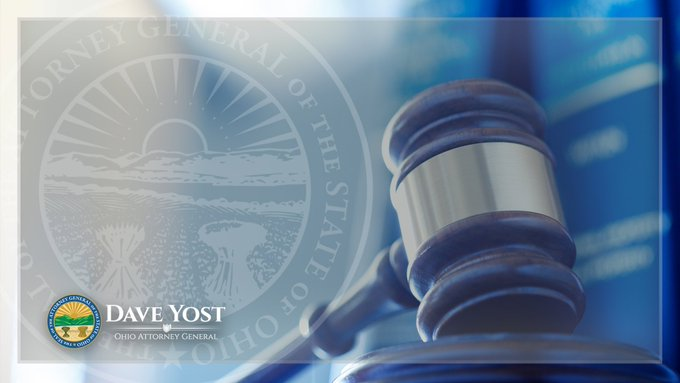
by Dan Starcher | Oct 24, 2023 | Blog
COLUMBUS, OH, Oct. 24, 2023 — Ohio Attorney General Dave Yost and 32 of his colleagues filed a federal lawsuit today against Meta alleging that the social-media technology giant designed and deployed harmful features for Facebook and Instagram to addict young users to its platforms and enhance its bottom line.
The lawsuit, filed in U.S. District Court for the Northern District of California, claims that Meta, instead of working to mitigate the damage inflicted by its social-mediA mobile phone with platforms, publicly concealed the severity of the psychological harm they cause, including addiction to the platforms, which could, and in some cases did, result in physical harm.
In related complaints filed today in state courts, eight other attorneys general made similar allegations. Florida is filing its own federal lawsuit in the U.S. District Court for the Middle District of Florida. The federal and state lawsuits stem from a bipartisan investigation of Meta.
“Given that children, when they’re on these platforms, become vulnerable to cyberbullying and online predators, Meta has added insult to injury, further injuring our children,” Yost said. “I trust that the parents within Meta itself might reconsider these practices, but, until then, initiating lawsuits should compel the company to change its ways.”
The federal lawsuit asserts that Meta violated state consumer protection laws by assuring the public that the platforms are safe and suitable for young users. Yet the company’s practices harmed and continue to harm the mental and physical health of teenagers and pre-teens, the suit maintains, fueling what the U.S. Surgeon General has called a “youth mental health crisis,” which has prompted suicides, devastated families, and damaged a generation of young people.
The complaint further alleges that Meta violated federal law – specifically, the Children’s Online Privacy Protection Act – when the company, aware that users younger than 13 were actively on its platforms, collected data from those users without parental consent. Meta targeted these youngest users after identifying them as a “valuable but untapped” base, as reported in a 2021 Wall Street Journal article.
Although much of the lawsuit relies on confidential material not yet available to the public, some publicly available sources – including disclosures from former Meta employees – detail how the company deliberately sought to gain financially by addicting teens and tweens to its platforms.
Meta’s platform algorithms, the lawsuit says, push users into descending “rabbit holes,” with the objective of keeping users on the platform for long periods. Meta also allegedly used features such as infinite scroll and near-constant alerts in a concerted effort to hold young users’ attention. Such manipulative tactics entice teens and tweens to continually return to the platforms. Instead of disclosing the harm and making meaningful changes to minimize it, Meta publicly advertised their platforms as safe for young users.
The attorneys general also allege that the platforms served harmful content – including material associated with eating disorders, violence, negative self-perception and body-image issues, and bullying – to young users.
The lawsuit seeks injunctive and monetary relief caused by Meta’s platforms.
Joining Yost in the federal filing are the attorneys general of Arizona, California, Colorado, Connecticut, Delaware, Georgia, Hawaii, Idaho, Illinois, Indiana, Kansas, Kentucky, Louisiana, Maine, Maryland, Michigan, Minnesota, Missouri, Nebraska, New Jersey, New York, North Carolina, North Dakota, Oregon, Pennsylvania, Rhode Island, South Carolina, South Dakota, Virginia, Washington, West Virginia and Wisconsin.
Filing lawsuits in their respective state courts are the attorneys general of the District of Columbia, Massachusetts, Mississippi, New Hampshire, Oklahoma, Tennessee, Utah, and Vermont.

by Wayne Ohio | Jan 11, 2022 | Blog, Uncategorized
COLUMBUS, OH, Jan. 11, 2022 — Ohio Attorney General Dave Yost today urged the Federal Communications Commission (FCC) to help stop the flood of foreign-based illegal robocalls that attempt to scam Americans.
Today’s letter sent by AG Yost and a bipartisan group of 51 attorneys general calls for the FCC to require gateway providers – the companies that allow foreign calls into the United States – to take steps to reduce how easily robocalls have been able to enter the U.S. telephone network, including implementing STIR/SHAKEN, a caller ID authentication technology that helps prevent spoofed calls.
“The main gatekeepers at the front doors are working to keep these people out,” Yost said. “We need the gatekeepers to the back doors and the windows to get in the game.”
Gateway providers should be required to implement this technology within 30 days of it becoming a rule to help eliminate spoofed calls and to make sure that international calls that originate from U.S. telephone numbers are legitimate. In December, Yost and a coalition of 51 attorneys general successfully helped to persuade the FCC to shorten by a year the deadline for smaller telephone companies to implement STIR/SHAKEN.
The attorneys general are asking the FCC to require these gateway providers to take additional measures to reduce robocalls, including:
Responding to requests from law enforcement, state attorneys general, or the FCC to trace back calls within 24 hours.
Blocking calls when providers are aware of an illegal or likely fraudulent caller.
Blocking calls that originate from numbers that are on a “do not originate” list – such as government phone numbers that are for incoming calls only.
Ensuring that foreign telephone companies they partner with are ensuring that calls are being made from legitimate numbers.
The attorneys general are also encouraging the FCC to require all phone companies to block calls from a gateway provider if it fails to meet these requirements. Illegal robocalls are a scourge – in 2020, Americans lost more than $520 million through robocall scams.
Attorney General Yost is joined in sending this letter to the FCC by the Attorneys General of Alabama, Alaska, Arizona, Arkansas, California, Colorado, Connecticut, Delaware, District of Columbia, Florida, Georgia, Hawaii, Idaho, Illinois, Indiana, Iowa, Kansas, Kentucky, Louisiana, Maine, Maryland, Massachusetts, Michigan, Minnesota, Mississippi, Missouri, Montana, Nebraska, Nevada, New Hampshire, New Jersey, New Mexico, New York, North Carolina, North Dakota, Oklahoma, Oregon, Pennsylvania, Rhode Island, South Carolina, South Dakota, Tennessee, Texas, Utah, Vermont, Virginia, Washington, West Virginia, Wisconsin, and Wyoming.

by Wayne Ohio | Dec 22, 2021 | Blog
COLUMBUS, OH, Dec. 22, 2021 — The Ohio Organized Crime Investigations Commission (OOCIC) – a collaborative effort involving federal, state, and local law enforcement agencies – seized more than $42 million in illegal drugs in 2021, surpassing the $29 million in confiscations the previous year.
Ohio Attorney General Dave Yost, Gov. Mike DeWine, and Homeland Securities Special Agent-in-Charge Vance Callender announced today that OOCIC’s major drug interdiction task forces confiscated the following drugs this year versus the previous year:

The notable one-year increase in seizure amounts is attributable to the addition of an OOCIC task force, the expansion of other OOCIC task forces, increased levels of drug trafficking in Ohio, and the culmination of long-term investigations. Also in 2021, OOCIC task forces seized 7,906 opioid pain pills and 1,205 other prescription pain pills.
“The law enforcement officers of our major drug interdiction task forces are guardians on the wall, protecting Ohioans from overdoses and death by seizing narcotics before they are distributed into our communities,” Yost said. “Substantially larger quantities of heroin, fentanyl, and methamphetamine were interdicted in 2021 than prior years, proof of our task forces’ vigilance to stay ahead of drug traffickers. I look forward to OOCIC’s continued success in 2022.”
The task forces, formed through partnerships with Homeland Security Investigations and local law enforcement agencies statewide, are funded through RecoveryOhio, in concert with the Ohio Department of Public Safety and Ohio Criminal Justice Services.
“The continued success of the task forces this past year can directly be attributed to the tireless efforts of police officers and special agents working together to arrest and prosecute those who seek to profit on the addictions of others,” Vance Callender, special agent in charge of Homeland Security Investigations (HSI) Detroit Field Office said, “HSI brings national and international resources to Ohio law enforcement so not only local dealers are arrested, but the leader/organizers who are the source of supply for local criminal networks and across the U.S. We want to ensure the broadest impact is brought to those who ultimately profit from these international conspiracies.”
The strength of the task forces stems from the multi-level involvement. Aided by federal intelligence, local agencies operating under OOCIC’s jurisdiction carry out drug interdictions to remove illegal narcotics from Ohio communities.
Here is a sampling of seizures in 2021:
Hamilton County Major Drug Interdiction Task Force
In April, the Hamilton County task force made four major seizures of narcotics destined for southwest Ohio from California. The seizures included more than 5 pounds of heroin and 43 pounds of methamphetamine.
In November, at the conclusion of an investigation that culminated in the felony federal indictment of four people, the task force seized 25 pounds of fentanyl, 1.2 pounds of cocaine, 38 pounds of marijuana, 13 firearms, and $43,701.
The task force includes the Hamilton County Sheriff’s Office, Regional Narcotics Unit, Homeland Security Investigations, and the Hamilton County Prosecutor’s Office.
Licking, Muskingum and Guernsey Major Drug Interdiction Task Force (CODE)
In June, CODE seized 2,350 grams of methamphetamine and 2,718 counterfeit Oxycodone pills found to contain fentanyl. The seizure led to the arrest of two Licking County men.
In September, the task force seized 24.5 pounds of methamphetamine, whose estimated street value exceeded $500,000.
The task force includes the sheriff’s offices in Licking, Muskingum, Guernsey, Knox, Perry, and Coshocton counties; the Ohio State Highway Patrol; the U.S. Postal Inspector; Homeland Security Investigations; and the Licking County Prosecutor’s Office.
Medina and Summit Major Drug Interdiction Task Force (ONSET)
In September, ONSET seized 13 kilograms of cocaine and a loaded handgun from subjects involved with a vehicle of interest that had ties to the Southwest border.
The task force includes the sheriff’s offices in Medina and Summit counties, the Copley Township Police Department, Homeland Security Investigations, the Drug Enforcement Agency, the Medina County Drug Task Force, the State Highway Patrol, the Summit County Drug Task Force, the Summit County Prosecutor’s Office, and the Medina County Prosecutor’s Office.
Belmont County Major Drug Interdiction Task Force
In March, during the arrest of a Bellaire man, the task force seized 9 pounds of methamphetamine, 6 ounces of cocaine, $3,861, and a loaded firearm.
In October, in executing multiple search warrants, the task force confiscated over 1 pound of methamphetamine and other narcotics, along with paraphernalia and packaging for distribution.
The task force includes the Belmont County Sheriff’s Office, the Belmont County Prosecutor’s Office, Homeland Security Investigations, and the Harrison County Sheriff’s Office.
Miami Valley Bulk Smuggling Task Force
In November, the task force identified an individual suspected of narcotics trafficking in Montgomery County, subsequently seizing 10 kilograms of cocaine and 1 pound of marijuana.
In December, the task force arrested Jose Noriega-Rodriquez of Sinaloa, Mexico, on charges of narcotics trafficking. Throughout their investigation, detectives seized 10 kilograms of fentanyl, 2 kilograms of cocaine, 1 kilogram of heroin, 336 grams of methamphetamine, 4 pounds of marijuana, and about $150,000.
The task force includes the sheriff’s offices in Montgomery and Clark counties, the police departments in Miami and Butler townships, the Montgomery County Prosecutor’s Office, the Ohio Bureau of Criminal Investigation (BCI), the State Highway Patrol, and Homeland Security Investigations.
Central Ohio Major Drug Interdiction Task Force
In February, an investigation conducted by the task force disrupted a complex trafficking scheme between Columbus and Las Vegas, Nevada which led to the indictment of three individuals on federal charges for the distribution of cocaine. The co-conspirators used short-term residential rentals in Columbus and other east coast cities as mailing locations to import smuggled cocaine from Mexico. After the narcotics were sold to local drug dealers, the cash proceeds were sent back to Las Vegas. Nationally, the group shipped and distributed over one hundred kilograms of cocaine and over $1,000,000.
The task force includes the Columbus Division of Police, BCI, Gahanna Police, the Internal Revenue Service, Homeland Security Investigations, the Madison County Sheriff’s Office, the State Highway Patrol, the U.S. Postal Inspector, Ohio HIDTA, and the Drug Enforcement Administration.
Toledo Major Drug Interdiction Task Force
In April, the task force worked with the Toledo Police Gang Unit and the Toledo Police SWAT Unit to execute a search warrant related to drug trafficking that originated in California. Suspect Brandon Moore was arrested and charged with multiple trafficking-related felonies and weapons charges after more than 20 pounds of marijuana, other drugs, a loaded pistol, and $48,000 were seized.
The task force includes the Toledo Police, the sheriff’s offices in Lucas and Wood counties, Homeland Security Investigations, the FBI, the Toledo Drug Task Force, the State Highway Patrol, Perrysburg Police, the U.S. Attorney’s Office Northern District of Ohio, the Lucas County Prosecutor’s Office and the Wood County Prosecutor’s Office.
Since 2012, OOCIC’s major drug interdiction task forces have seized narcotics with an estimated value of $285,014,414, including 692 pounds of heroin, 666 pounds of fentanyl, 1,563 pounds of methamphetamine, 1,763 pounds of cocaine, and 28,305 pounds of marijuana. The task forces have also seized $73,322,940 and 1,022 firearms.

by Wayne Ohio | Dec 1, 2021 | Blog
COLUMBUS, OH, Nov. 30, 2021 — Ohio Attorney General Dave Yost issued the following statement regarding today’s ruling by the U.S. District Court of Eastern Kentucky enjoining the federal vaccine mandate for federal contractors:
“This is not about vaccines, it’s about the mandates,” Yost said. “The judge’s opinion clearly states that and it has been our position all along that the president cannot impose these mandates on the people.”

by Wayne Ohio | Nov 15, 2021 | Blog
COLUMBUS, OH, Nov. 15, 2021 — Ohio Attorney General Dave Yost has filed a lawsuit against the social-media giant Facebook for misleading the public on how it controlled its proprietary algorithm all in an effort to boost its stock and deceive shareholders.
The lawsuit, filed on behalf of the Ohio Public Employees Retirement System (OPERS) and Facebook investors, contends that from April 29 through Oct. 21, 2021, Facebook and its senior executives violated federal securities laws by purposely misleading the public about the negative effects its products have on the health and well-being of children and the steps the company has taken to protect the public.
“Facebook said it was looking out for our children and weeding out online trolls, but in reality was creating misery and divisiveness for profit,” Yost said. “We are not people to Mark Zuckerberg, we are the product and we are being used against each other out of greed.”
Facebook’s scheme was revealed in the Wall Street Journal in September and in internal documents and statements provided in October by a former Facebook employee who blew the whistle on Facebook, underscoring how the company “chooses profit over safety.”
Zuckerberg and other company officials, the lawsuit maintains, knew that they were making false statements regarding the safety, security, and privacy of its platforms. Facebook admitted in those internal documents that “We are not actually doing what we say we do publicly.”
In roughly a month, those revelations caused a devaluation in Facebook’s stock of $54.08 per share, causing OPERS and other Facebook investors to lose more than $100 billion.
Yost’s lawsuit not only seeks to recover that lost value but also demands that Facebook make significant reforms to ensure it does not mislead the public about its internal practices.
The lawsuit isn’t the first action that Yost has taken against Facebook, which also owns Instagram. In May, he and 43 other attorneys general sent a letter to Zuckerberg urging him to halt his plans to introduce an Instagram app for kids.
Although Facebook pulled the plug on the app, the whistleblower’s recent testimony before Congress made clear that Facebook never abandoned its goal to expand its user base by grooming kids to use Facebook’s products in the future.
Through this lawsuit, Yost intends to reinforce that such improper targeting of children by the social media giant will not be tolerated.
Yost plans to ask the court by Dec. 27, 2021 – the deadline for such motions – to appoint OPERS as the lead plaintiff in his Facebook securities fraud action. He welcomes other Facebook investors to join him in holding the company and its executives accountable.
There is an existing lawsuit against Facebook with similar allegations that was filed earlier this year on behalf of a retail investor. That lawsuit defines an incorrect time period in which the harm by Facebook’s actions occurred and obscures the damage suffered by shareholders such as OPERS.
Yost is seeking to correct the period of time when the harmful actions took place and give Ohio a voice to hold Facebook accountable.





